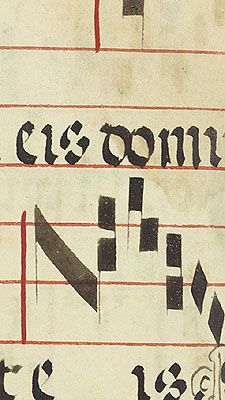
Medieval Music
![]()
In the Middle Ages, music was used in worship above all, and it constituted
an integral part of the liturgy. The Mass and the Divine Office were hardly
conceivable without the singing of plainchant. Known more commonly as
"Gregorian" chant, this style of liturgical music developed
during the Carolingian Renaissance as the fusion of Gallican and Roman
traditions. In the ninth century plainchant became associated with St.
Gregory the Great (pope from 590 to 604), but this connection was merely
a pious legend used to justify the innovation. Plainchant continued to
evolve after the time of Charlemagne; it did not receive its familiar
form of square notation until the 13th century. Its melodies number in
the tens of thousands.

Copyright
© 2002 Division of Rare & Manuscript
Collections
2B Carl A. Kroch Library, Cornell University, Ithaca, NY, 14853
Phone Number: (607) 255-3530. Fax Number: (607) 255-9524
For
reference questions, send mail to:
rareref@cornell.edu
If you have questions or comments about the site, send mail to: webmaster.